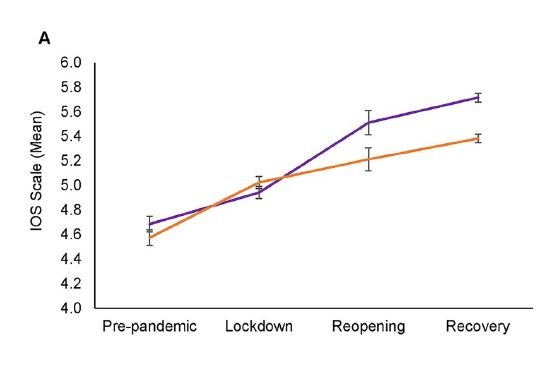A Surprising Study About Pandemic Pets, Stress, and Loneliness
/Study shows pandemic pets did little to curb stress / loneliness.
I’ve done a lot of disclosures over my years doing Impact Factor week in and week out, mostly when studies come from Yale or one of my colleagues, but this week I have a much more important disclosure.
I have a dog and a cat who… tolerate each other. Bodie, our dog, is seven and was wonderful to have during the pandemic.
The cat, who, like all cats, is constantly planning our deaths, is a post-pandemic addition.
I’m a dog person – but what does that really mean? I suppose it means that I value their companionship, or their loyalty. Or maybe just their attitude. I think having Bodie in my life adds something significant – he makes me happier. And, during the pandemic, playing outside and running around with him was a great release.
This is why I was so surprised to learn that pets – cute, fluffy, loveable pets – did very little to alleviate stress or loneliness during the COVID-19 pandemic.
We’re talking about this study, appearing in PLOS One.
Source: PLOS One
This was a longitudinal survey study of 4,237 individuals, beginning at the start of the pandemic with participants followed through to December of 2021. That means the study spanned the start of the pandemic, the initial lockdown, the subsequent reopening and what the researchers call “recovery” which was January to December of 2021. Pretty rough recovery if you ask me.
In any case the survey used several standardized instruments to gauge closeness to pets, stress, and several domains of loneliness.
My hypothesis would be that lockdown would lead to a spike in stress and loneliness, which would be ameliorated by pets and – of course – by dogs more than cats.
But that didn’t turn out to be the case.
We did grow closer to our pets during the pandemic. To assess this, the researchers used something called the “Inclusion of the Other in Self” scale – which looks like this.
Source: PLOS One
You ask the participant which Venn diagram feels most like their relationship with another entity – in this case a dog or cat. It’s cute.
Participants definitely felt closer to their pets over time, with dogs (in purple) outpacing cats (in orange) by half a point or so.
Source: PLOS One
But did that closeness help us? Did it stave off stress?
Not really.
Stress levels bumped modestly during lockdown across the board. In fact the lowest stress levels were seen in the non-pet owners – in orange in this graph. Though dog-owners (in black) were pretty similar.
Source: PLOS One
Seeing these results, I can understand them. I mean, having a pet during lockdown could conceivably increase your stress level. It’s one more mouth to feed, and the opportunities to do fun pet/owner stuff might be more limited.
But what about loneliness? Surely pets make you less lonely?
Maybe a bit. Across three domains of loneliness, dog-owners fared a bit better throughout the pandemic, with cat owners doing worse and the pet-free folks more or less in the middle.
Source: PLOS One
As a dog-person, not exactly the results I expected. But thinking a bit more deeply, as the authors did, perhaps we shouldn’t expect pets to have too dramatic an effect on our well-being. There is a truly complex web of causality between pet ownership, stress, and loneliness as you can see here. Pets can add to stress and they can reduce it. And of course, people who are feeling more lonely or stressed at baseline may be more likely to adopt a pet in the first place.
In the end, like so many studies that attempt to assess a complicated social construct, we are left with more questions than answers. To be honest, if we really wanted to figure this out we would conduct a randomized trial. Sign up and get randomized to a new puppy or a… placebo puppy. Something with the same cuteness factor but without the love and companionship. I think you might call it a cat.
A version of this commentary first appeared on Medscape.com.





